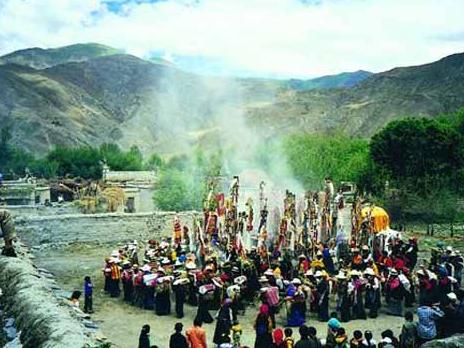
In the vast land of the Tibet Autonomous Region of China,which is regarded as"the Roof of the World,"diligent and smart Tibetan people have achieved much.Tibetan architectures,costumes,cuisines,folklores,epics,dances and festivals appeal deeply to outsiders.
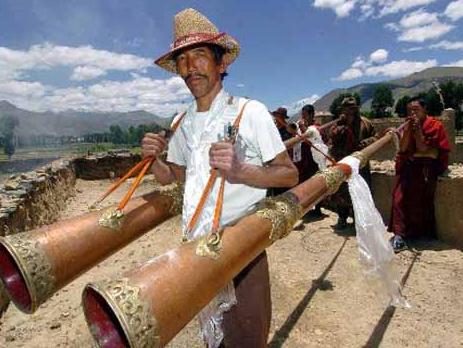
Tibetans are one of the oldest ethnic groups in China.They mainly reside in the Tibet Autonomous Region,as well as in Qinghai,Sichuan and Yunnan Provinces.There agriculture is mainly the planting of highland barley.In addition,there are other crops such as wheat,rape and peas.
Tibetans believe in Tibetan Buddhism,i.e.Lamaism.In the past,there were many traditional festivals relating to religious activities.The Tibetan calendar is based on the Yin-Yang(lunisolar)calendar,which consists of"five elements"(wood,fire,earth,gold and water).Twelve animals symbolize the calendar assorted by Yin-Yang.A round needs 60 years.And the New Year is the most important festival on the Tibetan calendar.
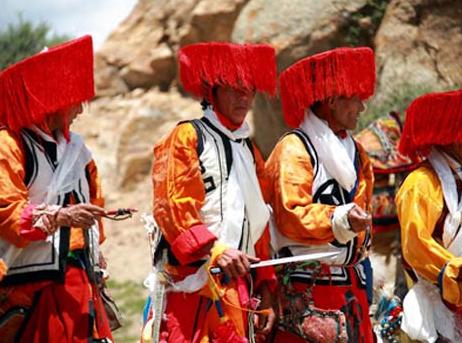
The Ongkor Festival is an old festival in farming areas of Tibet when all crops are waiting for the harvest.The Ongkor Festival is a time to wish for a good harvest.The Ongkor Festival originated in the valley in the middle and lower reaches of the Yarlung Zangbo River.The initial reason for the festival was to offer sacrifices to gods in the hope of receiving a good harvest.The date of the Ongkor Festival is not a fixed one,but it is decided according to the time when the qingke(a kind of highland barley)ripens in each village.
The Ongkor Festival lasts three days and will be celebrated a few days before the harvest.All the villagers,men and women,young and old,will put on their best holiday clothes,hold colorful flags with good wishes,and carry a"harvest tower"built with barley stalks.They sing and dance,beat drums and gongs,and walk around the fields.On this festival,people also enjoy horseracing.After the Ongkor Festival,locals will start their intense autumn harvest.
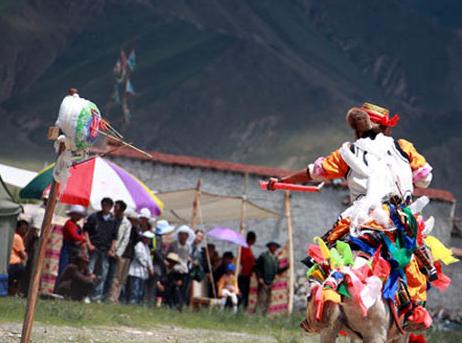
This is a very ancient tradition in Tibet.When Bonism dominated years ago,Bonism priests would manage the procedures.After the rising of Tibetan Buddhism,the ceremony changed to the present form.It is believed the original intention was probably to train Tibetan farmers for military coordination.
"Ongkor"in Tibetan means"surrounding the farmland."Major activities include horse racing,shooting,singing and dancing,Tibetan opera,stone holding and wrestling.The"Ongkor"not only shows people's wish for a good harvest,but is also a good time for them to rest.Since crops ripen at different times,the festival is held accordingly.
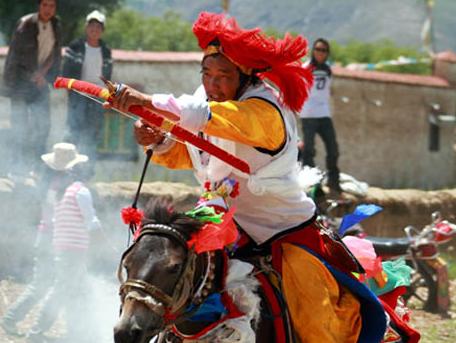
Some areas hold the Ongkor Festival in mid-summer.Each family sends out a representative,mostly woman,to form a 100-member team.They are dressed in grand Tibetan robes,wear their gold and silver jewels,carry dou(a measure for grain)and scripture books showing a good harvest and hold colorful arrows.Under the leadership of a revered man and accompanied by the sounds of ritual trumpets and drums,they move round the farmland outside the village,shouting:"Yangguxiu!Yangguxiu!"(meaning"Come back,the soul of the earth!")The old villagers will burn mulberries on the way and the Ongkor team must pass to worship gods.
Now the Ongkor Festival is more enriched than ever before.Besides the traditional folk performances and sports like horse race and archery,trade fair has been a new part in the festival,which promotes local economic exchange.





